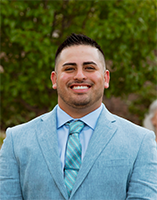Q&A with BACJ '25 Alum Jan Arismendy Valderrama, Police Officer at University of Colorado Boulder Police Department
Nora Scanlon | CU Denver School of Public Affairs Jun 16, 2025
In this School of Public Affairs interview, recent graduate and transfer student Jan Arismendy Valderrama '25 shares his journey from Caracas, Venezuela, to CU Denver, where he pursued a Bachelor of Arts in Criminal Justice with a concentration in Law Enforcement and a minor in Public Administration. He discusses how his background in law enforcement, passion for public service, and drive for leadership in policy reform led him to CU Denver, and how faculty support and flexible programming helped him thrive. He also reflects on favorite professors, landing a full-time role with the CU Boulder Police Department, and advice for future students navigating nontraditional academic paths.
Tell me a little bit about yourself: Where are you from? What are your interests and hobbies?
I was born in Caracas, Venezuela, and raised in Miami, Florida. I later moved to Colorado to pursue new opportunities and enjoy the outdoors. I'm very active—I love snowboarding, riding my motorcycle, and finding new hobbies that challenge me. I'm also passionate about public service and constantly learning, whether it's through reading, physical training, or traveling with my wife.
You came to CU Denver as a transfer student. Can you tell us more about your academic journey, and why you chose to transfer to CU Denver?
My academic path hasn’t been traditional. I started my school journey in the United States at Aurora Community College, where I earned my Associate of Arts in Translation and Interpretation along with several interpretation certificates. That program helped me build communication skills that I still use today, especially when bridging gaps in law enforcement and community engagement. After that, I earned a degree in Business Management and spent time working in both the private sector and law enforcement. Eventually, I realized I wanted to go deeper into the criminal justice system—not just in practice, but in policy and leadership. I chose CU Denver because of the strong reputation of its School of Public Affairs and the way the program is structured to support working professionals. I needed a program that could challenge me intellectually while still being realistic with my work schedule—and CU Denver delivered.
What influenced you to study Criminal Justice as your major?
After working in law enforcement, I realized how important it is to understand the justice system from multiple angles. I wanted to go beyond day-to-day enforcement and really dive into policy, reform, and leadership. Studying Criminal Justice helped me think more critically about the role law enforcement plays in society, and how we can improve both community relations and internal department practices.
You also completed a concentration in Law Enforcement, and a minor in Public Administration. What influenced you to pursue these programs? In what ways do Criminal Justice and Public Administration overlap, or complement, one another?
The Law Enforcement concentration allowed me to align what I was learning with what I experienced in the field. As for Public Administration, I chose it because I believe effective leadership and policy implementation are crucial to driving meaningful change in criminal justice. These fields overlap in so many ways—both are about service, accountability, and navigating complex systems. Understanding both the boots-on-the-ground and administrative sides has made me a more well-rounded professional.
Tell us about a favorite CU Denver class or professor.
Two professors come to mind immediately: Professor Michael Vogler and Professor Raya Kate Castronovo. They have very different teaching styles, but both are incredibly effective. Professor Vogler brought a grounded, no-nonsense approach that really spoke to my experience in the field. He has a gift for tying together academic theory and real-world application, and his law enforcement background added a lot of depth to our discussions. On the other hand, Professor Castronovo brought in a more holistic and systems-based perspective. She pushed us to think critically about policy, public impact, and community dynamics. What I appreciated most about both of them is how they made the material relatable and relevant—they used real-life examples, encouraged open dialogue, and created an environment where practical experience and academic insight complemented each other. Their classes weren’t just informative—they were energizing.
You also recently got a full-time job offer! Can you tell us more about the job?
Yes! I recently accepted a position with the University of Colorado Boulder Police Department. It’s a great opportunity that allows me to continue growing professionally while also giving me access to education benefits that I might use toward school in the future. I’m excited to serve in a new environment and contribute to campus safety in a more community-focused way.
You have now graduated, congratulations! What advice would you give future students, especially prospective transfer students?
Thank you! My biggest advice is don’t be afraid to start over or take a different path. Transferring schools can be intimidating, but CU Denver made the process smooth. Take full advantage of the resources available—professors, advisors, and even classmates. Stay organized, ask questions, and remember why you started. It’s never too late to pursue what you’re passionate about.
Is there anything else you would like to share with us?
I just want to express how grateful I am for the experience at CU Denver. The support from faculty and staff helped me find my voice, refine my goals, and prepare for the next chapter in my career. I hope to one day come back and contribute in some way—whether as a mentor, speaker, or future grad student.